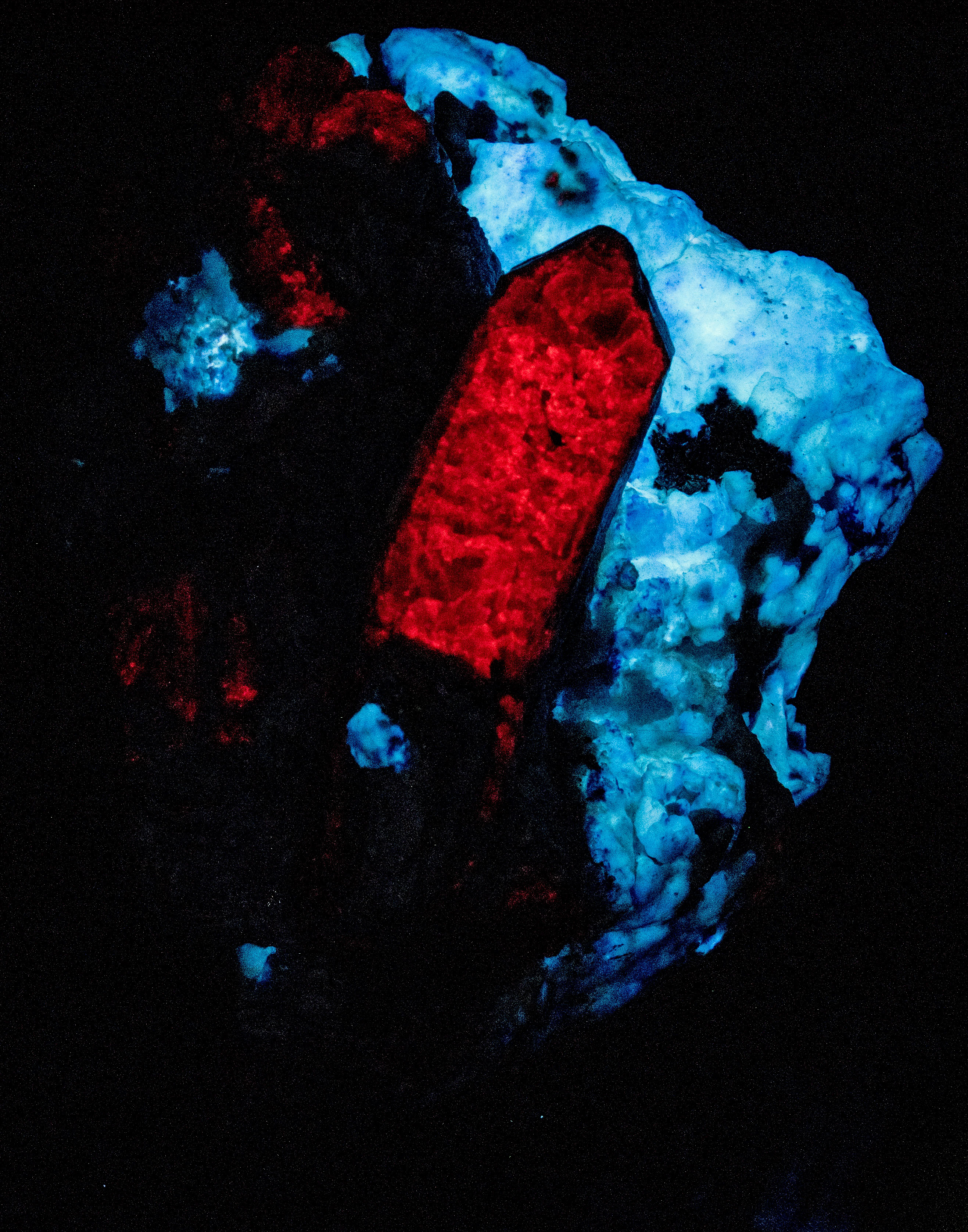Forsterite, Diopside, Calcite, and Sodalite from Afghanistan
Contributed by: Michael Crawford
Date: Jun 10th, 2025
Locality: Sar-e-Sang, Kuran wa Munjan District, Badakhshan, Afghanistan (See on Mindat)
Size: 12.5 x 15.5 cm
Description:
This fluorescent rock from Sar-e-Sang, Badakhshan, Afghanistan contains a large forsterite crystal. The crystal is 9.0 cm long and is 2.4 cm wide. The crystal has a core of forsterite and a rim of diopside. Forsterite with a rim of diopside is a common association for specimens from Sar-e-Sang. Forsterite fluoresces dark red in longwave UV light, brown in midwave UV light, and yellow brown shortwave UV light. Diopside fluoresces white to bluish white in all UV wavelengths. Other fluorescent minerals in the specimen are sodalite and calcite. Sodalite fluoresces orange in longwave UV light, bluish white in midwave UV light, and darker bluish white in shortwave UV light. The calcite fluoresces red in midwave UV light. The forsterite has red afterglow after exposing it to shortwave UV light for at least 60 seconds. One of the few minerals that have long-lasting red afterglow. The sodalite has a long-lasting afterglow after exposure to midwave and shortwave UV light. The sodalite afterglow is strongest after exposure to midwave UV light.
Both the calcite and forsterite exhibit BIP (brief intense phosphorescence). However, the BIP happens at different wavelengths. The calcite BIP occurs after sweeping a midwave UV LED flashlight across the specimen and the forsterite BIP happens when a longwave UV LED flashlight is swept across the specimen.
The fullwave image is a digital composite of the longwave, midwave, and shortwave images. The UV LED lights I use to take fluorescent pictures have very different intensities and I was not able to take a decent full-wave picture by using the different UV LED wavelengths at the same time. The longwave fluorescent response dominates the full-wave picture. The digital composite better represents the fluorescence of the individual minerals in a single, color image.
Summary of luminescence responses:
Forsterite (Mindat) (RRUFF)
- Fluorescence under Longwave (365nm LED) UV light: Red
- Fluorescence under Midwave (305nm LED) UV light: Orange
- Fluorescence under Shortwave (255nm LED) UV light: Yellow
- Afterglow after exposure to Shortwave (255nm LED) UV light: Red
- Fluorescence under Longwave (365nm LED) UV light: Orange
- Fluorescence under Midwave (305nm LED) UV light: White
- Fluorescence under Shortwave (255nm LED) UV light: White
- Afterglow after exposure to Midwave (305nm LED) UV light: White
- Afterglow after exposure to Shortwave (255nm LED) UV light: White
- Fluorescence under Midwave (305nm LED) UV light: Red
- Fluorescence under Shortwave (255nm LED) UV light: Red
- Fluorescence under Longwave (365nm LED) UV light: White
- Fluorescence under Midwave (305nm LED) UV light: White
- Fluorescence under Shortwave (255nm LED) UV light: White






